ON the morning of February 24, 2022, a heavily pregnant Maryna Korolov awoke in her Kyiv apartment, not to the song of birds, the aroma of coffee, or the familiar voices of loved ones, but to the sound of bombs.
In the distance, she could hear Russian bombs, falling, exploding, destroying, maiming, killing, and heralding the start of a war many had feared, but never thought would actually come to pass.
In her sleep-addled state, Maryna at first thought the sound of war arriving was some terrible nightmare. The fact that a chorus of car alarms in a nearby car park had all gone off appeared to lend credit to the idea that this was simply a fearful mind-playing tricks on her.
Only weeks before when she expressed her concerns about Putin’s forces launching a full-scale attack on her beloved homeland to her husband Vadym he had dismissed the idea and reassured her, “You’re pregnant. Try not to worry so much. Putin will never invade. It’s just political posturing, that’s all.”
Fast forward to the present and her husband’s alarmed and anxious face was now inches from her’s.
“Quick Maryna!” He urged. “The war has started - we have minutes to leave the apartment.”
From that moment on, Maryna’s life was defined by chaos.
Like millions of her fellow Ukranians, for whom death, displacement, and disorder were to become a way of life, she can separate her life into two dramatically distinct timelines - before and after the bombs fell.
“I’ll never forget the sound. It was the sound of everything changing for my country and everyone who called it home!” Maryna told the Chronicle from the cozy comfort of her Abergavenny juice bar - a safe place of civility and calm that’s a million miles and a world removed from the destruction and death that has engulfed her homeland.
“The sound of bombs is something you hear as well as feel,” explained Maryna. “It gets into your bones and sets every one of your senses on fire. It is the sound of something big, murderous, and evil that wants to destroy and kill.”
As husband and wife threw whatever clothes and essentials were at hand into a bag and tried hard not to wake and panic their two young boys, Sam and Mark, Maryna looked around the apartment she and her husband had bought earlier that year.
Her eyes fell upon the freshly painted nursery they had painted weeks earlier, and she shook her head in disbelief.
Once again, Putin’s forces were forcing her to leave the place she called home.
Eight years earlier in 2014, she had left the Eastern Ukraine city of Donetsk when Russian-backed militants and troops declared it a People’s Republic.
Since then she and Vadym had built a new life for themselves, and following a stint in Lviv, had set down roots in the Ukraine capital of Kyiv.
They were raising a family and although the threat that Russia represented was always on the fringes, they never believed it would come to this - a full-scale invasion.
Maryna explained, “The day before war broke out, I don’t know what it was, perhaps it was the intuition of a woman who was eight months pregnant, but I felt a terrible foreboding and remember asking Vadym, ‘If war comes, what plans do we have?’
Like millions of others, they didn’t have any. Because who in Europe really expected the terrible lessons of the past to be so causally and bluntly dismissed?
As the sounds of the bombing drew nearer, it dawned on the young family, it was now or never. They had to leave.
Carrying their sleeping children to the car, they got in and drove with no clear destination in mind except to head for the perceived safety of Western Ukraine with a plan to stay in a hotel for about three days until it was safe to return to Kyiv.
Maryna told the Chronicle, “As we were driving along the Zhytomyr Highway we listened to President Zelenskyy confirm on the radio that war was here.
"At about the same time our boys who had been asleep, woke up and asked why they were in a car in their pyjamas. We told the war had found us and I’ll never forget the look of fear on their faces.
“There was then an explosion and Sam said, “Mom! I can feel how my bones are shaking inside me!’ They were so scared and I felt so powerless because all we could do was keep driving and hope for the best.”
As they saw just how many cars were on the highway and how many people were trying to escape the bombs, Maryna and Vadym considered a change of plan.
“We have relatives in Poland, who after hearing about the outbreak of war, quickly phoned us and urged us to quickly get to the border, because they’d be more than happy to take us in,” revealed Maryna.
However, because Zelenskyy had declared full mobilisation and all able-bodied men of a certain age were being called upon to fight, only Maryna and the children would be allowed to cross the border into Poland.
With a new baby imminent, Maryna was adamant that the family stay together no matter the cost.
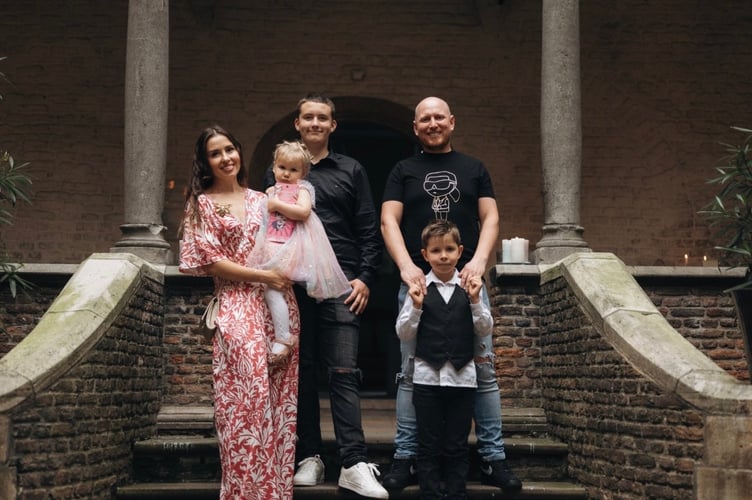
“We decided to stay in Western Ukraine for a month until our daughter was born and then see what happened,” Explained Maryna. “The children and I needed Vadym and the thought of being in different countries at such a time was unbearable.”
The family found refuge in the city of Lviv and because she took ill during the last weeks of her pregnancy, Maryna was forced to stay in a hospital.
“It was very upsetting being apart from Vadym and the boys, but I was very ill and it was for the best,” explained Maryna.”
In a strange twist of fate, Maryna discovered the hospital she was staying in used to be a Jewish Synagogue that was bombed during the Second World War.
Every night Maryna and the other patients would be moved to the air raid shelter beneath the hospital and it was here in March that her daughter, Emmanuella was born.
Because of the law that stipulates a man with the responsibility of the three children can legally leave Ukraine, Vadym and his family were finally allowed to cross the border for the relative safety of Poland.
Maryna explained, “We stayed in Poland for three months and then I received a text from my friend in the UK who said that we and the whole of Ukraine were in his prayers and he would like to help us apply for a visa to live and work in the UK.”
The friend was from Crickhowell but he had formerly been working for the British Embassy in Ukraine.
Before the war started Maryna and Vadym used to run a company that supplied artificial turf for sporting stadiums and they had first met the man during a football game where he was captaining the British Embassy team.
Through his help, Maryna and her family were put in touch with a Llangynidr gentleman named Jim Frost who would act as their sponsor and let them live at his home until they found their feet and could begin a new life.
Coming to the UK was an eye-opener for Maryna, who laughed when she explained, “We grew up in Ukraine thinking that Britain was a grey and dark land full of cold and storms. Where people were miserable and sat in old houses scowling and drinking whiskey in front of the fire, but my first impression of Wales couldn’t be more different.
“We arrived in June, the sun was shining everything was so green. The people were so friendly and welcoming and the mountains were beautiful. I thought, ‘We can be happy here because this country reminds me so much of Ukraine.’”
The Korolovs soon settled into the area and began making friends. Their eldest son started at Crickhowell School, their middle son enrolled at Llangynidr Primary School and Emmanuella now attends Nevill Hall Nursery.
It wasn’t long before Vadym found a job in Bristol laying astroturf, but although happy to be providing for his family and being able to afford to rent their own house in Llangattock, his heart wasn’t in it.
One day Vadym came from work and said, “I am a businessman Maryna. Most of my life I have run my own business and I want to do that again. I think Wales is a great place for us to start a business.’”
Maryna said, “It’s a good ambition but a crazy idea. What will we do?” To which her husband replied, ‘We will produce freshly squeezed juice that tastes like no other.’”
In January 2022, the couple purchased a manual juicer from Amazon and began the first tentative steps towards a new dream.
Starting with a stall outside the Market Hall, the husband and wife team worked around the clock and had stands at festivals such as The Royal Welsh as they slowly put their brand of freshly squeezed juice on the map.
In April of this year, Vadym saw an advertisement to rent an empty shop in Abergavenny, and after discussing it the couple decided to make the leap.
In July, the ever-popular ’Squeezing’ juice bar opened its doors in Abergavenny’s High Street.
Maryna explained, “We’ve had so much support and Abergavenny is such a friendly and vibrant place, that it’s been great. Every day people pop in just to say hello and ask about Ukraine.”
Talking about her country is something that is very important to Maryna.
War seen only on TV and in newspapers is a vastly different experience to people whose country it is happening to and Maryna is keen to raise awareness about the situation back home.
“We send money back home and help people understand the situation in Ukraine whenever we can,” said Maryna, “Ukraine isn’t the number one topic on social media anymore but it is still the number one priority in the hearts of all Ukrainians.”
According to an October report from the Council on Foreign Relations, since the outbreak of war, “Fighting and air strikes have inflicted over 30,000 civilian casualties, while 3.7 million people are internally displaced, and 6.5 million have fled Ukraine. 14.6 million people need humanitarian assistance."
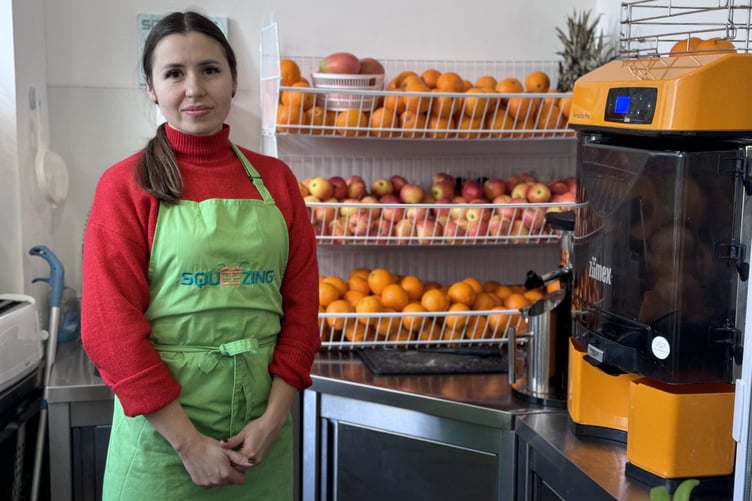
Looking back at nearly three long years of war, Maryna sighed and said, “In the beginning, all of Ukraine was of one heart. We were all united in our fight against Russia, but since then many people have seen too much death and lost some of their spirit. There have been so many tears.
“You see how the people reacted to the fire that happened in Abergavenny’s Frogmore Street? As bad as that was it is but a small shadow of what happens in Ukraine every night.
“My people have suffered years of bombs, fighting, and death and it makes me so angry because Putin is like a huge monster drinking the blood of Ukranians.
“Zelenskyy tries his best to let the world know the vital importance of not losing this war but Russia is very powerful and knows how to exhaust the hearts and minds of people.
“If Trump forces a deal and Ukraine loses 20 percent of her territory I don’t know how the people will react. It will be a huge blow to democracy but still, many will be glad that the war is over. Yet how do you explain that to all the mothers who have lost their sons on the frontline?”
Recalling a talk she gave on Ukraine in Hay-on-Wye earlier this year, Maryna explained, “Before I was due to speak I was sitting and watching a group of young children laughing and playing, and it made me feel so sad. I went to the toilets and cried for a good 20 minutes thinking of all the children back home who have had that innocence and safety snatched away from them by war.
“I had to slap myself in the face a few times to stop the tears. My family and I were lucky to have found safety in Wales, others were not. We must be strong for those still going through hell and let them know they are not alone.”
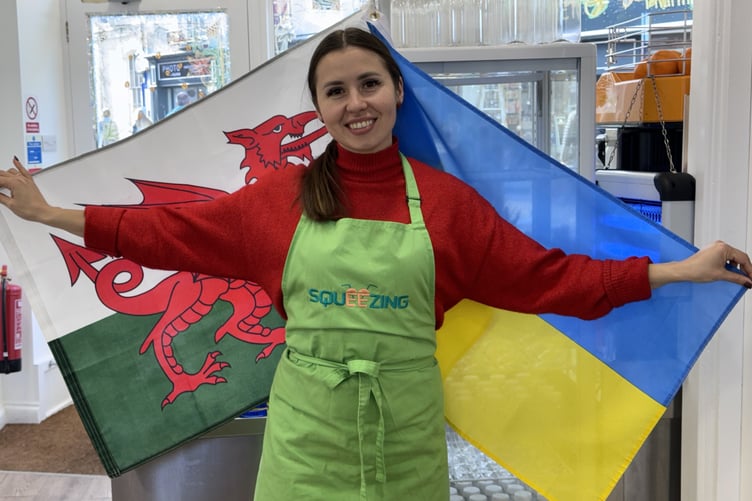
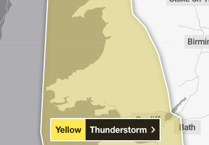
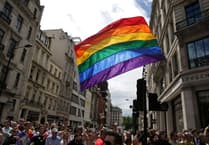
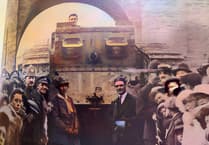
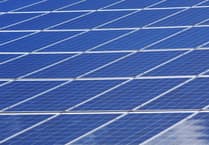
Comments
This article has no comments yet. Be the first to leave a comment.